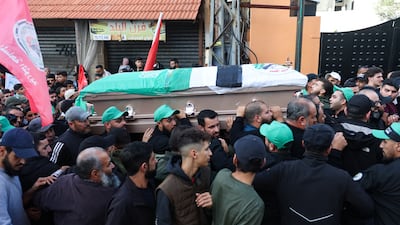Amid the continuing war in Gaza, many people are rightly concerned about the risk of the violence engulfing even more countries. “Metastasise” was the word used by US Secretary of State Antony Blinken during his series of meetings with regional leaders this week to describe the potential for wider conflict.
The reality is that a regional conflict is already under way, and it is Israel’s military carrying out the lion’s share of cross-border attacks, with no regard for the sovereignty of other states. The Israeli operation in southern Lebanon on Monday that killed Wissam Tawil – a commander in Hezbollah's elite Radwan force – was the latest in a string of assassinations and aerial strikes on neighbouring countries that threaten to exacerbate a highly volatile regional situation.
The stakes had already been raised by the Israeli drone strike of January 2 that killed senior Hamas figure Saleh Al Arouri and six other militants in Beirut. That assassination led the leaders of Hamas and Palestinian Islamic Jihad to tell Egyptian mediators that any further negotiations with Israel were off, closing off a potential avenue for talks.

Less than a week before that operation, Syria's official Sana news agency said Israel carried out two air strikes on its territory in 24 hours, including one on Damascus airport that is thought to have killed up to 11 members of Iran’s Islamic Revolutionary Guard Corps.
This is far from the first time that Lebanon and Syria have been bombed by Israel. They are both unstable countries, riven with domestic problems and home to militant groups and proxies outside of government control. Both are woefully ill-equipped to defend themselves from a military that has full US support, in the case of Syria, Israel continues to directly occupy part of its territory, the Golan Heights. By repeatedly bombing targets in both countries, Israel’s forces are increasing the likelihood of an uncontrollable escalation, not reducing it.
Israel’s argument is that such cross-border strikes are intended to bolster its security by removing dangerous enemies, even though it is often civilians who carry the brunt of these attacks. There is no disputing the fact that Hamas and Hezbollah are implacably opposed to Israel’s existence, and both groups have targeted Israeli civilians. But both organisations have also survived the violent removal of leading figures before and gone on to renew their attacks on Israel. It is the continuing and disproportionate Gaza operation – and increasingly repressive occupation of the West Bank – that is the ultimate source of danger for Israelis at home and abroad.
This is not to let other actors off the hook. The leaderships of Hamas and Hezbollah know there will be retaliation for their attacks against Israel yet they remain unconcerned for the lives of Palestinian and Lebanese civilians who are inevitably caught in the crossfire, instead factoring them into a cold political calculus. Elsewhere, Yemen’s Houthi rebels claim to be acting in solidarity with Gaza but by attacking and seizing ships in the Red Sea they have militarised one of the world’s most important waterways.
The longer the fighting in Gaza goes on, the greater the chance there is of a regional escalation. Similarly, high-stakes attacks by Israeli forces on neighbouring territory also fan the flames of war. An immediate ceasefire in Gaza is the key to breaking the chain of events that could lead to a major miscalculation, in addition to the fact that it is the only way to stop the suffering of over two million Gazans.


